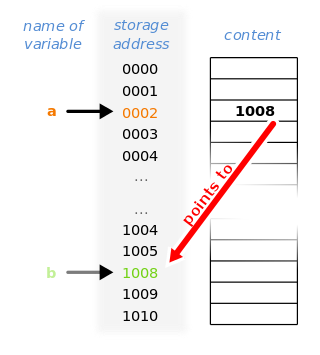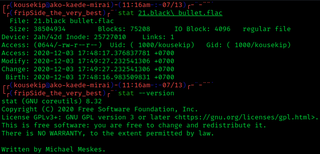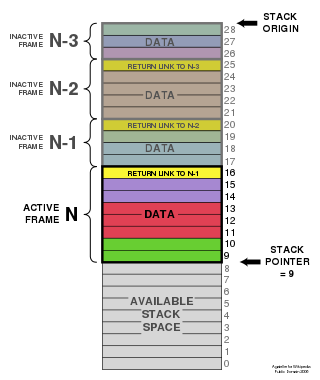
In information security and programming, a buffer overflow, or buffer overrun, is an anomaly whereby a program, while writing data to a buffer, overruns the buffer's boundary and overwrites adjacent memory locations.

The GNU Debugger (GDB) is a portable debugger that runs on many Unix-like systems and works for many programming languages, including Ada, C, C++, Objective-C, Free Pascal, Fortran, Go, and partially others.
x86 assembly language is the name for the family of assembly languages which provide some level of backward compatibility with CPUs back to the Intel 8008 microprocessor, which was launched in April 1972. It is used to produce object code for the x86 class of processors.
A heap overflow, heap overrun, or heap smashing is a type of buffer overflow that occurs in the heap data area. Heap overflows are exploitable in a different manner to that of stack-based overflows. Memory on the heap is dynamically allocated at runtime and typically contains program data. Exploitation is performed by corrupting this data in specific ways to cause the application to overwrite internal structures such as linked list pointers. The canonical heap overflow technique overwrites dynamic memory allocation linkage and uses the resulting pointer exchange to overwrite a program function pointer.
In computing, a bus error is a fault raised by hardware, notifying an operating system (OS) that a process is trying to access memory that the CPU cannot physically address: an invalid address for the address bus, hence the name. In modern use on most architectures these are much rarer than segmentation faults, which occur primarily due to memory access violations: problems in the logical address or permissions.
C dynamic memory allocation refers to performing manual memory management for dynamic memory allocation in the C programming language via a group of functions in the C standard library, namely malloc, realloc, calloc, aligned_alloc and free.
The syntax of the C programming language is the set of rules governing writing of software in the C language. It is designed to allow for programs that are extremely terse, have a close relationship with the resulting object code, and yet provide relatively high-level data abstraction. C was the first widely successful high-level language for portable operating-system development.

In computer science, a pointer is an object in many programming languages that stores a memory address. This can be that of another value located in computer memory, or in some cases, that of memory-mapped computer hardware. A pointer references a location in memory, and obtaining the value stored at that location is known as dereferencing the pointer. As an analogy, a page number in a book's index could be considered a pointer to the corresponding page; dereferencing such a pointer would be done by flipping to the page with the given page number and reading the text found on that page. The actual format and content of a pointer variable is dependent on the underlying computer architecture.

stat is a Unix system call that returns file attributes about an inode. The semantics of stat vary between operating systems. As an example, Unix command ls uses this system call to retrieve information on files that includes:
In software, a stack overflow occurs if the call stack pointer exceeds the stack bound. The call stack may consist of a limited amount of address space, often determined at the start of the program. The size of the call stack depends on many factors, including the programming language, machine architecture, multi-threading, and amount of available memory. When a program attempts to use more space than is available on the call stack, the stack is said to overflow, typically resulting in a program crash.
In computer programming, an entry point is the place in a program where the execution of a program begins, and where the program has access to command line arguments.

Stacks in computing architectures are regions of memory where data is added or removed in a last-in-first-out (LIFO) manner.
sizeof is a unary operator in the programming languages C and C++. It generates the storage size of an expression or a data type, measured in the number of char-sized units. Consequently, the construct sizeof (char) is guaranteed to be 1. The actual number of bits of type char is specified by the preprocessor macro CHAR_BIT, defined in the standard include file limits.h. On most modern computing platforms this is eight bits. The result of sizeof has an unsigned integer type that is usually denoted by size_t.
In computing, exec is a functionality of an operating system that runs an executable file in the context of an already existing process, replacing the previous executable. This act is also referred to as an overlay. It is especially important in Unix-like systems, although it exists elsewhere. As no new process is created, the process identifier (PID) does not change, but the machine code, data, heap, and stack of the process are replaced by those of the new program.
In software engineering, a fluent interface is an object-oriented API whose design relies extensively on method chaining. Its goal is to increase code legibility by creating a domain-specific language (DSL). The term was coined in 2005 by Eric Evans and Martin Fowler.
In software, a stack buffer overflow or stack buffer overrun occurs when a program writes to a memory address on the program's call stack outside of the intended data structure, which is usually a fixed-length buffer. Stack buffer overflow bugs are caused when a program writes more data to a buffer located on the stack than what is actually allocated for that buffer. This almost always results in corruption of adjacent data on the stack, and in cases where the overflow was triggered by mistake, will often cause the program to crash or operate incorrectly. Stack buffer overflow is a type of the more general programming malfunction known as buffer overflow. Overfilling a buffer on the stack is more likely to derail program execution than overfilling a buffer on the heap because the stack contains the return addresses for all active function calls.

ATS is a programming language designed to unify programming with formal specification. ATS has support for combining theorem proving with practical programming through the use of advanced type systems. A past version of The Computer Language Benchmarks Game has demonstrated that the performance of ATS is comparable to that of the C and C++ programming languages. By using theorem proving and strict type checking, the compiler can detect and prove that its implemented functions are not susceptible to bugs such as division by zero, memory leaks, buffer overflow, and other forms of memory corruption by verifying pointer arithmetic and reference counting before the program compiles. Additionally, by using the integrated theorem-proving system of ATS (ATS/LF), the programmer may make use of static constructs that are intertwined with the operative code to prove that a function attains its specification.
Different command-line argument parsing methods are used by different programming languages to parse command-line arguments.
The write is one of the most basic routines provided by a Unix-like operating system kernel. It writes data from a buffer declared by the user to a given device, such as a file. This is the primary way to output data from a program by directly using a system call. The destination is identified by a numeric code. The data to be written, for instance a piece of text, is defined by a pointer and a size, given in number of bytes.

RaftLib is a portable parallel processing system that aims to provide extreme performance while increasing programmer productivity. It enables a programmer to assemble a massively parallel program using simple iostream-like operators. RaftLib handles threading, memory allocation, memory placement, and auto-parallelization of compute kernels. It enables applications to be constructed from chains of compute kernels forming a task and pipeline parallel compute graph. Programs are authored in C++.






